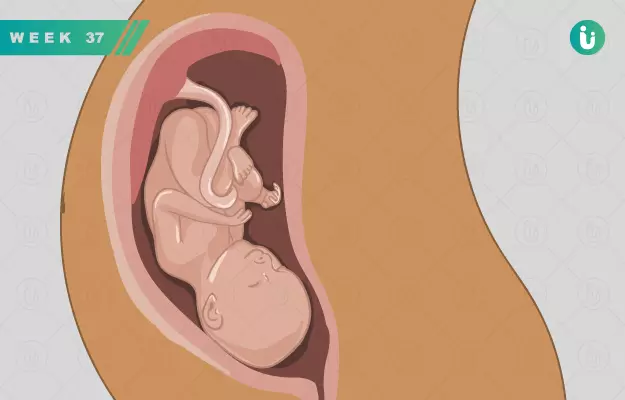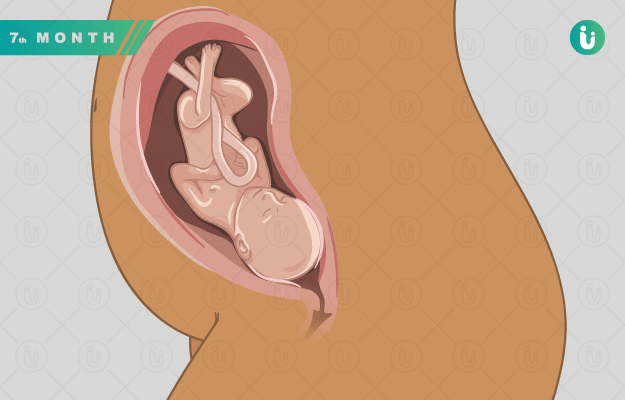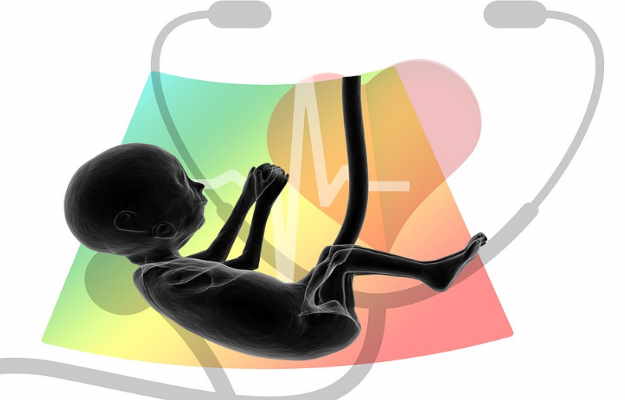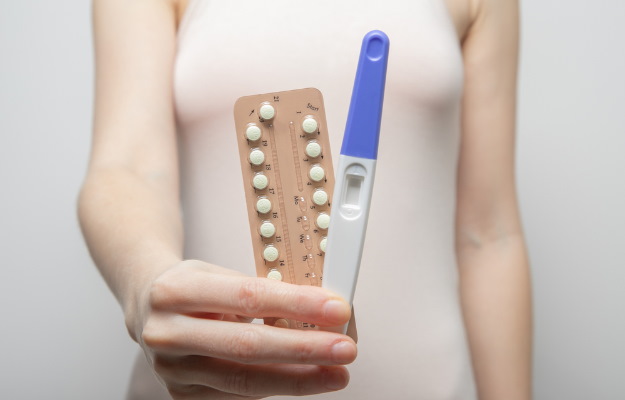Welcome to the 37th week of your pregnancy! The countdown that you and your partner started is almost over. You have just three short weeks to go! Your delivery date is approaching soon and you must be experiencing a mixed bag of feelings.
You and your partner should be aware of the fact that feeling some sort of anxiety is normal. During this phase of your pregnancy, your doctor might ask you to drop by for a visit each week and might inform you which mode of delivery is recommended for you; that is a vaginal birth or a caesarean section.
You must ensure that you are comfortable with the hospital where you would be delivering your baby after all these regular visits and check-ups.
The 37th week of your pregnancy would be very similar to your 36th week of pregnancy, as the risk of unwanted complications still persists. Keep yourself informed about these complications so that you know how to quickly resolve these situations and if a hospital visit is required. Follow each and every piece of advice that your doctor gives you.
It might be difficult to manage your daily activities and work with your current pregnancy. But don’t get swayed from the ultimate goal now; that is, to have a safe and successful delivery. Therefore, your pregnancy should be your top priority in the final month of your gestational period. Be watchful about what you are eating and make sure you consume the adequate amount of nutrients that your dietician has recommended to you. (Read more: What to eat and what not to eat during pregnancy)
The goal of this article is to help you understand the various kinds of changes that are going to take place in your body this week as well as the development of your baby. It will also make you aware of the numerous complications that can arise in the 37th week of your pregnancy. So, read on:
- Body changes during 37th week of pregnancy
- Baby development in 37th week of pregnancy
- Ultrasound in 37th week of pregnancy
- Pregnancy symptoms in the 37th week
- Complications in the 37th week of pregnancy
- Tips for 37th week of pregnancy
Body changes during 37th week of pregnancy
Your body has continued to change throughout your pregnancy. Some changes are expected to take place in the 37th week as well. These may include the following:
- You may find it easier to breathe. This is because of the fact that your lungs have more space to expand once the baby has descended into your pelvis.
- A lot of late-pregnancy symptoms like acidity during pregnancy may reduce or disappear as and when your baby descends into your pelvic region. Once the pressure on your abdominal organs decreases, indigestion and constipation during pregnancy will also subside.
- Due to this descent, you might experience an increased pressure on your bladder which could result in frequent urination. You may have to wake up a few times in the night to go to the bathroom. But sleep during pregnancy is very important; make sure you budget a few extra hours in the day to catch up on your rest. You could also have a small amount of urinary leak when you laugh or sneeze; this is normal and nothing to worry about.
- Need for nesting: This is basically a need to organize, decorate and clean your surroundings. It is associated with a rush of energy. You have a chance to use this energy to prepare for the arrival of your baby, by arranging clothes, preparing the safe sleeping area for your baby and organizing your delivery kit for the hospital. (Read more: Baby bedtime routine)
- Slight dilatation of your cervix might be observed this week. The cervix is the vital connection between the uterus and the vagina. This dilation suggests that your body is preparing itself for delivery. Cervical dilatation might be associated with a sharp pain sensation. Some females might begin to dilate on the day of delivery, while others might start this process before that.
- Softening of your body tissues and joints to aid in the delivery process may occur this week, too
- Braxton Hicks contractions: Also known as false contractions, these contractions are of lower intensity than labour contractions. Braxton Hicks contractions are intermittent (do not persist) and can be relieved by changing positions or resting, or if you were resting when they started, slowly walking around the room with additional support if you need it. You should be able to differentiate between true and false labour pains. You can ask your doctor about these differentiating features if you have not been informed already. (Read more: Contractions during pregnancy)
- Sometimes, you can experience leg or ankle swelling in your final month.
- Balance issues: The drastic increase in your body mass will make it difficult for you to balance your own body. Try wearing shoes with flat soles or add support in your washroom to prevent slipping.
- Mood swings: Your pregnancy mood swings might increase this week. They may even last longer.
- If you are carrying twins or multiples, visit your doctor regularly for pregnancy checkups this week. There's a good chance that your doctor will recommend inducing labour soon if you don't go into labour on your own this week. (Read more: Twin pregnancy)
Baby development in 37th week of pregnancy
Your baby reached full-term at the end of the 36th week of gestation and the beginning of the 37th week. This is definitely an important landmark in your pregnancy. Having said that, it is expected that your baby will continue to grow in the 37th week of pregnancy.
Your baby’s top to toe length must be around 49-50 cm (an increment of about 1 cm from the previous week) whereas your baby would weigh about 2.83 kilograms, which is approximately half a kilo heavier than what your baby weighed in the 36th week. These numbers would normally keep rising till your delivery date.
The following changes in the baby’s body can be observed in the 37th week of pregnancy:
- Weight gain in the 37th week of pregnancy is expected to slow down as there is very little space left in the uterus for the baby to grow further.
- Baby fat will keep on rising this week which will fill out your baby's loose and wrinkled skin as well as aid in maintaining the baby’s temperature after birth. (Read more: What to do and expect in the first hour after your baby is born)
- The muscles that will help your baby to suckle will fully develop now if they haven’t already. This gives rise to a perfectly rounded face.
- Your baby’s skull still remains soft as compared to the other bones in his or her body. This helps in the baby’s delivery as the head is the largest part of the body.
- Your baby is shedding most of his or her lanugo (layer of hair that provides insulation) and vernix (a waxy layer that protects the skin).
- The amniotic fluid keeps on reducing as your delivery date approaches. The amniotic fluid is defined as the fluid that provides nourishment and cushioning to your baby.
Ultrasound in 37th week of pregnancy
Your doctor may recommend a pregnancy ultrasound, to measure your baby’s head, stomach and femur, to get an idea of your baby’s weight this week.
A routine ultrasound at this stage could also help to discover any fetal abnormalities that have not been diagnosed so far, and prepare adequately for the baby's arrival.
Pregnancy symptoms in the 37th week
You may experience some major symptoms this week. It is good if you keep yourself informed and know basic remedies to reduce their duration and severity. You should go to the hospital if any of these clinical features become unbearable.
The following symptoms might be observed in the 37th week of pregnancy:
- Sciatic nerve pain: Sciatic nerve pain during pregnancy is a very common complaint, even in the last month of pregnancy. Normally, if your baby has descended, it should release some amount of pressure on the surrounding nerves. But sometimes the pain persists. The pressure on the sciatic nerve may result in intense pain in your back, groin and lower limbs. As a quick treatment, apply a warm compress over the area that is tender or ask your doctor to prescribe you some simple and safe painkillers such as paracetamol.
- Round ligament pain: Women can feel some amount of pain in the lower abdomen or groin that occurs due to round ligament pain during pregnancy. The nature of this pain can be described as a stabbing sensation. Patients may describe this pain on one side of the body (unilateral) or it might be widespread (diffuse). Some alarming signs include radiating unbearable pain sensation. If these alarming signs persist, you should visit the hospital.
- Varicose veins: Some pregnant females may develop varicose veins even in the 37th week as a result of excessive pressure and inflammation on the inferior vena cava (a major blood vessel that carries deoxygenated blood from the limbs to the heart). Patients with varicose veins will present to their doctor with large blue venous clusters which cause pain. They most commonly occur in the lower limbs, anal region and the vulva.
- Fatigue: Most pregnant ladies complain of fatigue. Pregnancy itself is a tiring experience. The added pressure of organizing the home to welcome the new baby results in most females not resting enough and not consuming enough food and water. This tiredness can in turn affect your work and daily activities. If you feel low due to this fatigue, remind yourself that this is just temporary.
- Sleep problems: You might be experiencing some sleeping issues this week. This can be explained by the fact that your body is in discomfort due to generalised body pain, digestive issues and excessive urination. Hormonal imbalance during pregnancy is also another reason that can lead to sleep disorders. If you have vivid dreams in your sleep, it is a good idea to get up and have a glass of water. You may also choose to share these dreams with your family and friends if you need emotional support. You should make sure that you get around 12 hours of sleep each day. Sleeping in the afternoon for a couple of hours can help in achieving this target.
- Digestive issues: Undesirable digestive issues such as heartburn, belching, bloating and acid reflux are common occurrences throughout pregnancy. If these symptoms are bothersome, you may want to talk to your doctor about this as he/she can prescribe antacids and safe proton pump inhibitors to resolve these issues.
Complications in the 37th week of pregnancy
The following complications may be seen during the 37th week of pregnancy:
- Stillbirth: Fetal death that occurs after the 20th week of pregnancy is termed as a stillbirth. If you experience vaginal bleeding, abdominal pain, excessive contractions, or if you haven't felt the baby move in 12-24 hours, visit the hospital immediately. Stillbirths can be prevented if the problem is diagnosed and treated early.
- Hypertensive diseases: Some pregnant females may present to their doctor with high blood pressure even in the final month of pregnancy. Hypertension that develops after the 20th week of pregnancy is termed as gestational hypertension. If proteins are present in urine along with hypertension then that patient is said to be suffering from preeclampsia. Sometimes, patients present with seizures as well. This condition is called eclampsia. It is a medical emergency.
- Subchorionic haemorrhage: Subchorionic haemorrhage is defined as a condition in which the placenta gets seperated partially from the site where it was originally attached. This results in severe bleeding per vaginum.
- Infections: Pregnancy is a state of low immunity. Pregnant females are susceptible to developing bacterial infections such as bacterial vaginosis and urinary tract infections. If they are exposed to high risk patients, then they can also develop hepatitis or genital herpes.
- Placenta previa: In placenta previa, a low-lying placenta covers the cervix completely or partly. If the placenta hasn't migrated upwards yet, your doctor may ask you to come for visits and ultrasounds more often. If placenta previa persists, a C-section would have to be performed to avoid complications such as excessive bleeding during childbirth.
Tips for 37th week of pregnancy
Now that you have reached the 37th week of your pregnancy, you must make sure you tick all the items off on the following checklist:
- Collect information about what you should do when labour starts. This information can be gathered from your doctor or a midwife. They will tell you when you have to call and go to the hospital in case your contractions start or water breaks.
- You should be well aware of all the three stages of labour. This will help you prepare mentally and feel confident when your delivery actually happens.
- If you already have children, inform them about the arrival of your newborn. Arrange for someone to take care of them while you are at the hospital if you have not done that already.
- Arrange essential supplies such as food, pantry staples, toiletries and diapers for the newborn.
- Make sure your delivery kit is ready with a change of clothes, a charger and your medical records of this pregnancy.
Find Obstetrician and Gynaecologist in cities
- Obstetrician and Gynaecologist in Bangalore
- Obstetrician and Gynaecologist in Mumbai
- Obstetrician and Gynaecologist in Ghaziabad
- Obstetrician and Gynaecologist in Chennai
- Obstetrician and Gynaecologist in Pune
- Obstetrician and Gynaecologist in Delhi
- Obstetrician and Gynaecologist in Hyderabad
- Obstetrician and Gynaecologist in New Delhi
- Obstetrician and Gynaecologist in Gwalior
- Obstetrician and Gynaecologist in Gurgaon










































